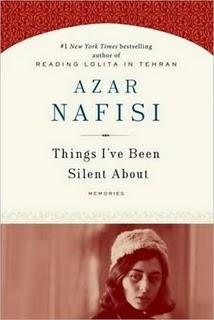Things I’ve Been Silent About

Things I’ve Been Silent About is the second memoir for bestselling author Azar Nafisi. Offering a larger lens into her life than Reading Lolita in Tehran, Nafisi tells her life’s story and the story of her country of Iran. Interspersed throughout her memories are references to poems and novels that had a profound impact on her, as well as memories of revolts and protests preceding and following the Iranian revolution.
A captivating theme in Nafisi’s memoir is the interwoven relationship between myth and reality. When the realities of Nafisi’s life are illogical, irrational, and uncontrollable, she retreats to the world of fiction. As a child, she finds comfort and escape from her severely depressed mother in the stories she creates. She constantly has her head in a book, obsessed with ancient tales and, eventually, modern literature. Fiction is the reliable fixture that offers a comforting presence in her life. Her mother’s mythical versions of reality—which she tyrannically imposes upon her family—make Nafisi’s quest for truth more urgent. Her quest expands as a result of the seemingly nonsensical nature of post-Revolution Iran, which saw the promise of equality replaced by the rise of authoritarianism and the depletion of women’s rights.
Nafisi’s memoirs hold true to the saying that the personal is political. She tells the history of the Iranian Revolution through her story. These profound insights are weakened by the battle she continuously wages with her mother’s ghost. The magnitude of resentment and unresolved issues towards her mother that she writes about threaten to make an otherwise powerful story into an unreadable epic of self-pity.
The memoir is also weakened by Nafisi’s profuse obsession with proving her critics wrong—the same literary critics that found Reading Lolita in Tehran to be an orientalist work relying on Western stereotypes to portray Iran. She goes to great haste to strengthen her father’s political stances; she too often repeats his love of Iran, critique of the Shah’s regime, and desire for revolution. Yet she never acknowledges that her family’s economic and political privileges situate them in a less vulnerable position than many other Iranians. Instead, she portrays herself as the victim and the martyr at many points in her life.
However, the dynamic relationships between myth and reality—and the personal and political—are the redeeming factors that ultimately make Things I’ve Been Silent About an enlightening and moving memoir.